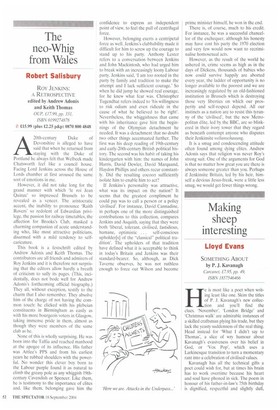The neo-Whig from Wales
Robert Salisbury
ROY JENKINS: A RETROSPECTIVE edited by Andrew Adonis and Keith Thomas OUP, £17.99, pp. 331, ISBN 0199274878 © £15.99 (plus £2.25 p&p) 0870 800 4848
20th-century Duke
A of
Devonshire is alleged to have said that when he returned from staying with the Duke of Portland he always felt that Welbeck made Chatsworth feel like a council house. Facing Lord Jenkins across the House of Lords chamber at first aroused the same sort of emotions in me.
However, it did not take long for the grand manner with which 'le roi Jean Quinze' so impressed Brussels to be revealed as a veneer. The aristocratic accent, the inability to pronounce 'Raith Rovers' so redolent of Edwardian privilege, the passion for railway timetables, the affection for Brooks's Club, masked a charming companion of acute understanding who, like most attractive politicians, disarmed with a mild tendency to selfcaricature.
This book is a festschrift edited by Andrew Adonis and Keith Thomas. The contributors are all friends and admirers of Roy Jenkins and it is therefore not surprising that the editors allow hardly a breath of criticism to sully its pages. (This, incidentally, does not bode well for Andrew Adonis's forthcoming official biography.) They all, without exception, testify to the charm that I also remember. They absolve him of the charge of not having the common touch: he clicked with his plebeian constituents in Birmingham as easily as with his more bourgeois voters in Glasgow, taking immense pride in them, almost as though they were members of the same club as he.
None of this is wholly surprising. He was born into the Taffia and reached manhood at the apogee of its influence. His father was Attlee's PPS and from his earliest years he rubbed shoulders with the powerful. No wonder this clever boy born to the Labour purple found it as natural to climb the greasy pole as any whiggish 19thcentury Cavendish or Spencer. Like them, he is testimony to the importance of elites and, like them, belonging gave him the confidence to express an independent point of view, to feel the pull of centrifugal force.
However, belonging exerts a centripetal force as well. Jenkins's clubbability made it difficult for him to screw up the courage to stand up to his party. Anthony Lester refers to a conversation between Jenkins and John Mackintosh, who had urged him to break with an increasingly loony Labour party. Jenkins said, 'I am too rooted in the party by family and tradition to make the attempt and I lack sufficient courage.' So when he did jump he showed real courage, for he knew what fear was. Christopher Tugend hat refers indeed to 'his willingness to risk odium and even ridicule in the cause of what he believed to be right'. Nevertheless, the whiggishness that came with his inheritance gave him the beginnings of the Olympian detachment he needed. It was a detachment that no doubt two other things accentuated further. The first was his deep reading of 19th-century and early-20th-century British political history. The second was his habit of taking his kindergarten with him: the names of John Harris, David Dewier, David Marquand, Haydon Phillips and others recur constantly. Did the resulting cocoon sufficiently isolate him to enable him to act?
If Jenkins's personality was attractive, what was its impact on the nation? It seems that the greatest compliment he could pay was to call a person or a policy 'civilised'. For instance, David Cannadine, in perhaps one of the more distinguished contributions to this collection, compares Jenkins and Asquith, saying that they were both 'liberal, tolerant, civilised, fastidious,
humane, optimistic . self-conscious upholder[s] of the "classical" political tradition'. The upholders of that tradition have defined what it is acceptable to think in today's Britain and Jenkins was their standard-bearer. So, although, as Dick Taverne observes, he was not ruthless enough to force out Wilson and become prime minister himself, he won in the end, There is, of course, much to his credit. For instance, he was a successful chancellor of the exchequer, although his honesty may have cost his party the 1970 election and very few would now want to recriminalise homosexual acts.
However, as the result of the world he ushered in, crime seems as high as in the days of Dickens, thousands of babies who now could survive happily are aborted every year, the ladder of opportunity is no longer available to the poorest and we are increasingly regulated by an old-fashioned institution in Brussels which is destroying those very liberties on which our prosperity and self-respect depend. All our instincts as a nation are to resist this tyranny of the 'civilised', but the new Metropolitan elite, led by the BBC, are so blinkered in their ivory tower that they regard as beneath contempt anyone who disputes their Jenkinsite weltanschauung.
It is a smug and condescending attitude often found among dying elites. Andrew Adonis says that religion was never Roy's strong suit. One of the arguments for God is that no matter how great you are there is always someone greater than you. Perhaps if Jenkinsite Britain, led by his heir, himself a devious Jesus-freak, were a little less smug, we would get fewer things wrong.


















































































 Previous page
Previous page